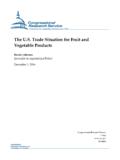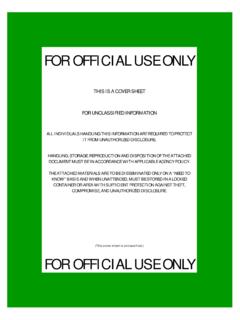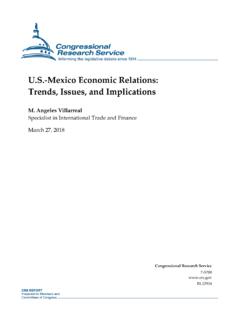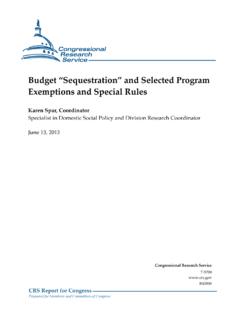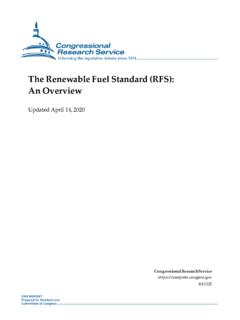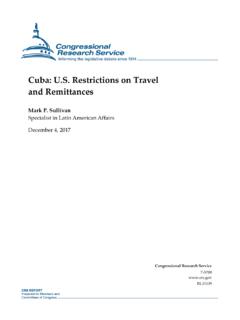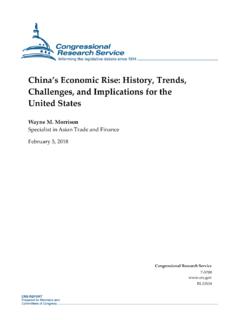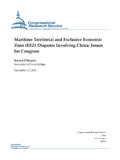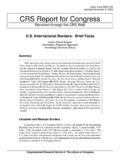Transcription of Statute of Limitation in Federal Criminal Cases: An Overview
1 Statute of Limitation in Federal Criminal Cases: An Overview Charles Doyle Senior Specialist in American Public Law November 14, 2017 Congressional Research Service 7-5700 RL31253 Statute of Limitation in Federal Criminal Cases: An Overview Congressional Research Service Summary A Statute of limitations dictates the time period within which a legal proceeding must begin. The purpose of a Statute of limitations in a Criminal case is to ensure the prompt prosecution of Criminal charges and thereby spare the accused of the burden of having to defend against stale charges after memories may have faded or evidence is lost.
2 There is no Statute of limitations for Federal crimes punishable by death, nor for certain Federal crimes of terrorism, nor for certain Federal sex offenses. Prosecution for most other Federal crimes must begin within five years of the commitment of the offense. There are exceptions. Some types of crimes are subject to a longer period of Limitation ; some circumstances suspend or extend the otherwise applicable period of Limitation . Arson, art theft, certain crimes against financial institutions, and various immigration offenses all carry statutes of Limitation longer than the five-year standard. Regardless of the applicable Statute of limitations, the period may be extended or the running of the period suspended or tolled under a number of circumstances, such as when the accused is a fugitive or when the case involves charges of child abuse, bankruptcy, wartime fraud against the government, or DNA evidence.
3 Ordinarily, the Statute of limitations begins to run as soon as the crime has been completed. Although the Federal crime of conspiracy is complete when one of the plotters commits an affirmative act in its name, the period for conspiracies begins with the last affirmative act committed in furtherance of the scheme. Other so-called continuing offenses include various possession crimes and some that impose continuing obligations to register or report. Limitation -related constitutional challenges arise most often under the Constitution s ex post facto and due process clauses. The Federal courts have long held that a Statute of limitations may be enlarged retroactively as long as the previously applicable period of Limitation has not expired.
4 The Supreme Court recently confirmed that view; the ex post facto proscription precludes legislative revival of an expired period of Limitation . Due process condemns pre-indictment delays even when permitted by the Statute of limitations if the prosecution wrongfully caused the delay and the accused s defense suffered actual, substantial harm as a consequence. A list of Federal statutes of Limitation in Criminal cases and a rough chart of comparable state provisions are attached. This report is available in an abbreviated form as CRS Report RS21121, Statute of Limitation in Federal Criminal Cases: A Sketch, without the attachments, footnotes, or attributions to authority found here.
5 Statute of Limitation in Federal Criminal Cases: An Overview Congressional Research Service Contents Introduction .. 1 Prosecution at Any Time .. 2 Limits by Crime .. 3 Suspension and Extension .. 3 Child Protection .. 4 DNA .. 4 Concealing Bankruptcy Assets .. 5 Wartime Statute of Limitations .. 5 Indictment or Information .. 6 Foreign Evidence .. 8 Fugitives .. 10 Conspiracies and Continuing Offenses .. 11 Constitutional Considerations .. 14 Ex post Facto .. 14 Due Process .. 16 Attachment 1. Periods of Limitation for Specific Federal Crimes (Citations) .. 17 No Limitation .. 17 Death Penalty Offenses .. 17 Terrorism-Related Offenses Resulting in or Involving the Risk of Death or Serious Injury.
6 20 Child Abduction and Sex Offenses .. 21 20 years .. 22 10 years .. 22 8 years .. 23 Generally .. 23 Federal Crimes of Terrorism That Do Not Result in or Involve the Risk of Death or Serious Injury .. 23 7 years .. 24 6 years .. 25 5 years .. 25 3 years .. 25 1 year .. 25 Attachment 2. Selected State Felony Statutes of Limitation .. 25 Contacts Author Contact Information .. 30 Statute of Limitation in Federal Criminal Cases: An Overview Congressional Research Service 1 Introduction The Constitution s Speedy Trial Clause1 protects the criminally accused against unreasonable delays between his indictment and trial.
7 Before indictment, the statutes of Limitation , and in extreme circumstances, the Due Process Clauses2 protect the accused from unreasonable delays. This is an Overview of Federal law relating to the statutes of Limitation in Criminal cases, including those changes produced by the act. The phrase Statute of limitations refers to the time period within which formal Criminal charges must be brought after a crime has been The purpose of a Statute of limitations is to limit exposure to Criminal prosecution to a certain fixed period of time following the occurrence of those acts the legislature has decided to punish by Criminal sanctions.
8 Such a Limitation is designed to protect individuals from having to defend themselves against charges when the basic facts may have become obscured by the passage of time and to minimize the danger of official punishment because of acts in the far-distant past. Such a time limit may also have the salutary effect of encouraging law enforcement officials promptly to investigate suspected Criminal activity. 4 Therefore, in most instances, prosecutions are barred if the defendant can show that there was no indictment or other formal charge filed within the time period dictated by the Statute of Statutes of Limitation are creatures of Statute .
9 The common law recognized no period of An indictment could be brought at any time. Limitations are recognized today only to the extent that a Statute or due process dictates their Congress and most state legislatures have enacted statutes of Limitation , but declare that prosecution for some crimes may be brought at any Federal statutes of Limitation are as old as Federal crimes. When the Founders assembled in the First Congress, they passed not only the first Federal Criminal laws but made prosecution under those laws subject to specific statutes of Similar provisions continue to this day. 1 CONST.
10 Amend. VI. 2 Id. amends. V and XIV. 3 Statute of Limitations, BLACK S LAW DICTIONARY (10th ed. 2014). 4 Toussie v. United States, 397 112, 114-15 (1970). 5 The Statute of limitations is an affirmative defense that can be lost either explicitly, by pleading guilty, or by failure to raise it at or before trial. Musacchio v. United States, 136 S. Ct. 709, 717 (2016)( [T]he statutory text, context, and history establish that 3282(a) imposes a nonjurisdictional defense that becomes part of a case only if a defendant raises it in the district court. ); see also United States v. Fernandez, 722 1, 27 (1st Cir. 2013) (signed waiver); United States v.

